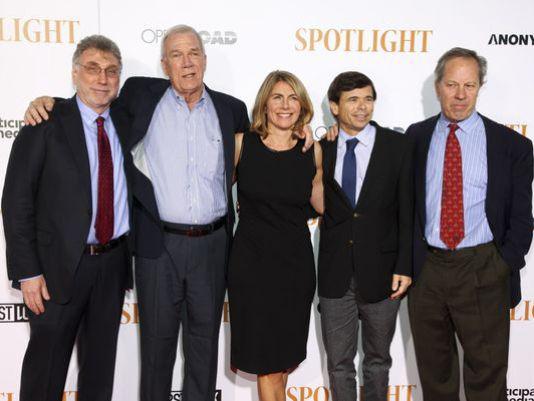|
Accountability still missing from Catholic church
News-Press
You can’t expect a movie, even one as riveting as Spotlight, to change the culture of a centuries-old institution like the Catholic Church. But perhaps the film can remind the church of its unfinished business in confronting a decades-long cover-up of rampant child molestation. The movie depicts an investigation by the Spotlight reporting team at The Boston Globe, which broke the news in January 2002 and brought international attention to a sickening scandal in Boston that has since engulfed the church around the world. In the United States alone, more than 17,000 victims have reported sexual abuse, going back as far as 1950, involving about 6,400 priests in 100 cities. Yet, not once in the past 14 years has a single U.S. bishop, let alone a cardinal, been removed from ministry for a role in the scandal. Perhaps the church could not have prevented child molesters from entering the priesthood, but bishops and cardinals could have stopped the crimes of serial predators. Many children would have been spared had religious leaders done what you’d expect any decent person to do: Report alleged crimes to authorities and, at the very least, keep molesters away from children. Often, they did neither. Reports of abuse were ignored. Predator priests were sent for “treatment,” then shuffled off to other parishes, often to molest again. When lawsuits threatened to blow the church’s cover, the cases were settled secretly. Over the past decade, as the role of the enablers came out, some were allowed to slip quietly into retirement. Cardinal Roger Mahony — former archbishop of Los Angeles, who plotted in the 1980s with an adviser to conceal child-molesting priests from law enforcement — retired in 2011. While he was later rebuked by his successor, he kept his cardinal's robes and faced no harsh words from then-Pope Benedict XVI. No better example exists than Boston’s own Cardinal Bernard Law, who was at the center of that city’s scandal. He resigned his post under public pressure in 2002 but landed a cushy Vatican job. There, among other duties, he helped pick new bishops. Even when two bishops resigned under fire in separate cases last year — a rare occurrence that might have signaled a move toward greater accountability — neither faced a public reprimand from Pope Francis. Minneapolis-St.Paul Archbishop John Nienstedt, for instance, had presided over an archdiocese that prosecutors indicted for allegedly failing to protect children. The charges are still pending. Under Pope Francis, known for his humility and humanity, survivors of abuse had hoped for something better. Last June, when the Vatican announced plans to create a tribunal for bishop accountability, Phil Saviano, now 63, who was molested for three years starting at age 11 in Worcester, Mass., thought maybe times were changing. "So many years have gone by, and nothing has happened," he says. Eight months later, there has been no news about tribunal members, staff, rules or a timetable for when it might take cases. Catholic Whistleblowers, an advocacy group for victims, has filed four petitions against church leaders with the Vatican, hoping to get to the tribunal. The response? Silence. Holding bishops and cardinals accountable is one of the best ways to impress young men coming into the priesthood, or priests rising in the ranks, with the notion that there are consequences for enabling abuse. Members of a commission, created by Pope Francis to come up with advice on how to deal with the continuing scandal, attended a special showing of Spotlight at the Vatican this month. The pope, according to news reports, was not in the audience. Perhaps he, too, should watch. The Globe’s reporting should have marked the beginning of the end of a horrific chapter for the Catholic Church. A just ending can be written only when those who enabled and hid sexual abuse of children are finally held to account. U.S. bishops:Healing wounds our mission It is important to state that the work of fostering a safe environment for children is a top priority and sacred responsibility of the Catholic Church. In 2002, Pope John Paul II addressed sexual abuse in the Church and called it “a crime.” In light of this abuse, he said that “the Church herself is viewed with distrust.” In a 2010 pastoral letter, Pope Benedict XVI said to bishops, “It cannot be denied that some of you and your predecessors failed, at times grievously, to apply the long-established norms of canon law to the crime of child abuse.” This past September, Pope Francis, immediately after meeting with victims of sexual abuse, spoke to the bishops taking part in the World Meeting of Families in Philadelphia. He said, “I commit myself to ensuring that the Church makes every effort to protect minors, and I promise that those responsible will be held to account. Survivors of abuse have become true heralds of hope and ministers of mercy; humbly we owe our gratitude to each of them and to their families for their great courage in shedding the light of Christ on the evil sexual abuse of minors.” The Charter for the Protection of Children and Young People, adopted by the U.S. bishops in 2002, requires involving civil authorities, no matter how long ago an allegation may have occurred. It requires zero tolerance, meaning anyone credibly accused is permanently removed from ministry. It requires background checks, psychological screening of seminarians, safe environment training for children and adults, and regular audits to ensure diocesan compliance and transparency. The task of healing wounds caused by sin is not seen as a distraction to the work of the Church — it is our mission!
|
.
Any original material on these pages is copyright © BishopAccountability.org 2004. Reproduce freely with attribution.
